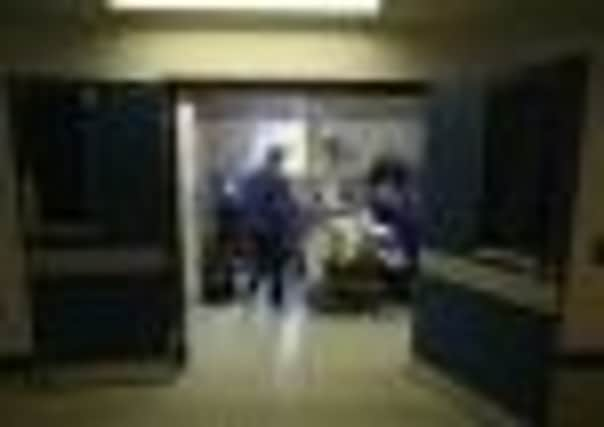Report suggests re-starting hearts to boost organ donation numbers


More has to be done to the increase organ numbers, the British Medical Association (BMA) said today.
That includes considering “difficult concepts” like re-starting hearts so that they can be used in transplants.
Advertisement
Hide AdAdvertisement
Hide AdOther options include using organs from higher-risk patients such as the elderly, and developing guidelines for using the hearts of babies aged under three months who have no chance of surviving.
The BMA said all these options could boost donor rates in the current “opt-in” system, where people are asked to join the organ donor register.
The BMA remains in favour of an opt-out system, currently being considered in Wales, where a patient is presumed to give consent for their organs to be used unless they have expressly said they do not want this.
There are more than 7,600 people currently waiting for a transplant in the UK, with more who need a transplant but are too ill to go on the list.
Today’s report said that although “good progress” has been made towards a target to boost organ donor rates by 50% by 2013, it will be a “significant challenge” to achieve this.
It added: “Whether or not the target of 50% is reached, people will still be dying unnecessarily while waiting for an organ transplant.”
Last month, Tim Statham, chief executive of the National Kidney Federation, said too many people were dying because of poor strategy around boosting donor rates - and argued the 50% target will be missed.
The new study, from the BMA’s Medical Ethics Committee, said that as “doctors it is difficult to see our patients dying and suffering when their lives could be saved or dramatically improved by a transplant”.
Advertisement
Hide AdAdvertisement
Hide AdIt argued that, in principle, there is no difference between transplanting hearts from donors whose death had been diagnosed by brain stem testing (DBD) and those whose death is diagnosed by their heart stopping (cessation of circulatory function, DCD).
DCD donors are patients who have had treatment withdrawn once it has been recognised that nothing can be done to prolong life and any further treatment would not be in their best interests.
At present, most organs from DCD donors are kidneys, but some pancreases, livers and lungs have also been transplanted.
The report said re-starting hearts once a patient has died a circulatory death is feasibly possible and should be researched further so hearts can be used.
“The fact that an individual is declared dead following cessation of cardio-respiratory function but the heart is subsequently restarted and transplanted into another person is a difficult concept”, it said.
Regarding young babies, the experts said there are currently no standard tests for diagnosing their brain stem death.
“This means that neonatal hearts are not donated in the UK. There are brain stem death testing standards for neonates in other parts of Europe, however, and so currently neonatal hearts are imported.
“This is an area that requires attention so that the diagnosis of death in neonates is brought into line with other countries.”
Advertisement
Hide AdAdvertisement
Hide AdThe report argued more needs to be done to increase organ donor rates from A&E departments rather than just focusing on patients in intensive care.
“Currently, in many such cases treatment is withdrawn in the emergency department and organ donation is not considered.”
Experts also looked at ways consent rates can be improved among relatives, saying the refusal rate is “particularly high” among black and ethnic minority populations.
Dr Tony Calland, chairman of the BMA’s Medical Ethics Committee, said: “We are at a crossroads in terms of public policy.
“As a society we need to decide whether we should accept that we have done all we can or whether we should move forward, cautiously, and look at other options for increasing the number of donors.
“There needs to be a public debate on what will work for the UK so that people on the transplant list do not die waiting for a donor.
“These are complex issues that throw up many ethical challenges.
“It is important that society discusses them openly in a reassuring way.
Advertisement
Hide AdAdvertisement
Hide Ad“The aim here is to save lives while at the same time protecting individual rights and autonomy.
“While our report explores a number of options the BMA continues to believe that an opt-out system with safeguards is the best way forward for the UK.”
Dr Paul Murphy, a consultant in intensive care and clinical lead for organ donation at NHS Blood and Transplant, welcomed the report.
He told the BBC: “Any initiative that encourages people to think and talk about the importance of organ donation helps to change attitudes and ensures that donation is seen as a routine part of end-of-life care in the UK.
“We are optimistic that we will achieve the taskforce’s predicted 50% increase by 2013 but acknowledge that this will be tough and all parts of the donation process will need to work to their full potential for us to deliver this goal.
“We will focus over the next year on removing the barriers that currently lead 43% of UK families to refuse organ donation because they don’t know what their relatives’ wishes were.”
Sir Bruce Keogh, NHS Medical Director, said: “This report is a welcome contribution to the debate about how we encourage more people to be organ donors.”